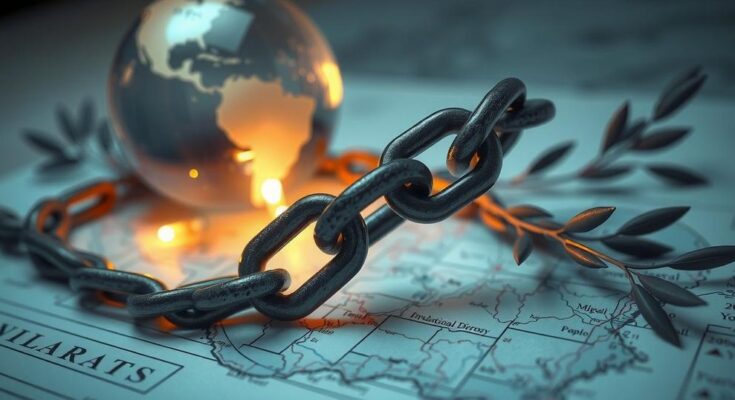President Trump has signed an executive order to freeze aid to South Africa due to a controversial law allowing the government to confiscate farmland from ethnic minorities, particularly White farmers, without compensation. The move has been met with strong opposition from South African officials, who claim it misrepresents the country’s history and violates principles of fairness and equality. The order also includes provisions for assisting Afrikaners facing discrimination within South Africa.
On Friday, President Donald Trump signed an executive order to freeze US aid to South Africa due to a controversial law allowing the expropriation of farmland from ethnic minorities, particularly White farmers, without compensation. Trump condemned the South African government’s policies, asserting they reflect a “shocking disregard for its citizens” and claiming they constitute human rights violations. He mandated US agencies to cease support for South Africa unless deemed necessary, amidst broader criticisms regarding the country’s relationships and policies concerning Israel and Gaza.
In response, South African President Cyril Ramaphosa has refuted claims of land confiscation, expressing a desire to collaborate with the Trump administration on land reform initiatives. The order also dictates support for Afrikaners, who are reportedly fleeing South Africa to escape alleged discrimination, specifically through resettlement assistance via refugee programs. Trump emphasized that US aid would not be available as long as South Africa continues these discriminatory practices.
South Africa’s foreign ministry criticized Trump’s directive, highlighting its concern over misinformation. They argued that the order inaccurately represents historical injustices from colonialism and apartheid. Moreover, they pointed out the ironic provision for refugee status for a group perceived as economically privileged while vulnerable asylum seekers in the US face deportation despite significant hardships.
Historically, discriminatory policies have dislocated Black South Africans from their land. Despite constitutional provisions aimed at land redistribution post-apartheid, the majority of land is still privately owned by a minority, leaving many Black citizens in poverty. President Ramaphosa recently enacted legislation facilitating government expropriation of land without compensation, intending to address past injustices.
The United States previously slated nearly $440 million for aid to South Africa in 2023, with over $270 million allocated through USAID. This freeze in aid coincides with the Trump administration’s broader efforts to curtail foreign assistance. Furthermore, Trump has accused South Africa of adopting a hostile posture against the United States and its allies, particularly regarding its stance on Israel and its relationships with countries like Iran.
The South African government has formally leveled accusations against Israel at the International Court of Justice for alleged acts of genocide against Palestinians. Trump, without presenting evidence, has previously indicated that funding would remain suspended until allegations of discrimination and land confiscation by South Africa were fully investigated. During discussions earlier in the week, Ramaphosa shared concerns with Elon Musk about the dissemination of misinformation regarding South Africa.
In his state of the nation address, Ramaphosa asserted that South Africa would remain resilient and steadfast, indicating that the nation would not be intimidated by external pressures. His comments reflect a commitment to uphold the values embedded in the South African constitution, which emphasizes justice and equality for all citizens.
The article discusses President Trump’s decision to freeze foreign aid to South Africa, which was motivated by a controversial law permitting the expropriation of farmland from White farmers without compensation. This action arises amid broader concerns regarding human rights violations and discrimination against Afrikaners. The historical context includes land dispossession during apartheid, efforts for land reform since 1994, and ongoing economic disparities, particularly for Black South Africans, who constitute a significant portion of the population. Trump’s order also referenced geopolitical tensions surrounding South Africa’s positions on Israel and Iran, further complicating international relations.
In summary, President Trump’s executive order to freeze aid to South Africa highlights significant geopolitical and socio-economic tensions surrounding land reform policies and human rights considerations. This directive reflects a controversial stance on international support tied to domestic policies in South Africa, drawing sharp responses from the South African government regarding allegations of misrepresentation and historical injustices. Consequently, the ongoing debate continues to evolve within the context of global and domestic political dynamics.
Original Source: www.cnn.com




